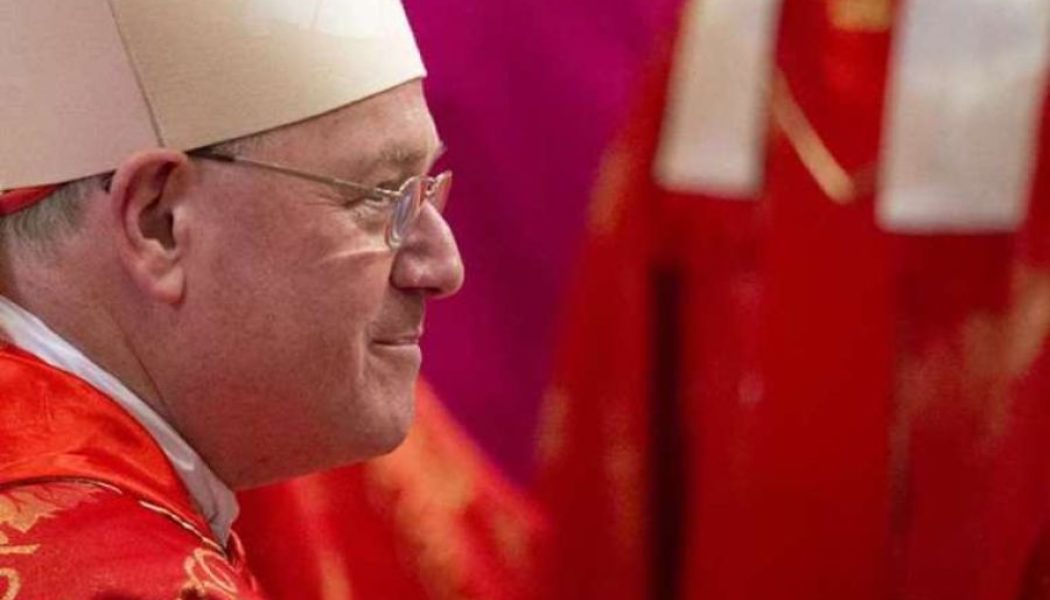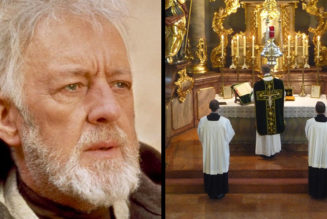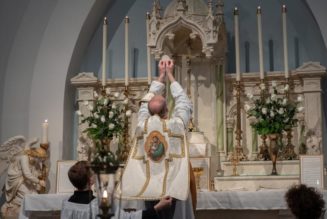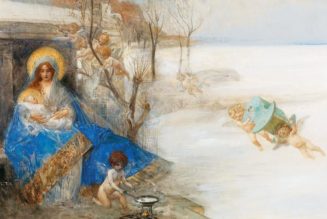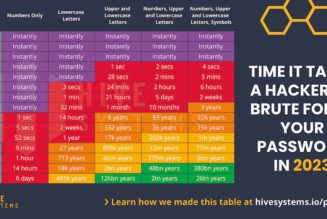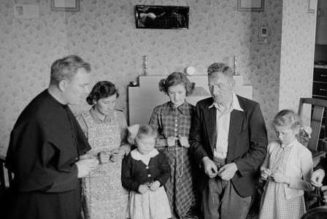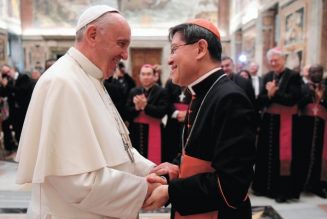A suggestion by an Eastern Rite bishop that Catholics in the United States once again give up eating meat on Fridays throughout the year has drawn interest from more than a dozen bishops in the country.
Several bishops told the Register they hope the U.S. bishops discuss the idea at their next gathering in June 2025.
But an early canvas suggests a renewed practice, if it occurs, might look different from the Church’s previous rule, which forbade Catholics from eating meat on almost all Fridays of the year under pain of mortal sin. Several bishops told the Register they don’t want to go that route.
“A voluntary return to an act of penance, for instance meatless Fridays, would be an opportunity for Catholics not only to demonstrate their shared commitment to care for God’s creation, but also reorient themselves to a spirit of self-sacrifice in gratitude for Jesus making the ultimate sacrifice for us on the cross that first Good Friday,” Cardinal Timothy Dolan, archbishop of New York, told the Register by email through a spokesman.

He said he’s grateful for the suggestion and hopes “that it becomes widespread in its acceptance.”
The Register contacted representatives for more than 170 Latin Rite bishops who lead dioceses in the United States and several Eastern Rite bishops in the country.
Most didn’t respond; 41 declined comment.
But of those bishops who offered a reaction, 13 either said they support it or are open to the idea.
“It seems to me that a little more sacrifice and penance couldn’t hurt, because of the demands of the world today,” Bishop James Conley of the Diocese of Lincoln, Nebraska, told the Register. “I think we need more opportunities for sacrifice, not less.”

Where Did the Idea Come From?
Metropolitan Archbishop Borys Gudziak, who leads the Archeparchy of Philadelphia Ukrainian Catholic Church, floated the idea as one of what he called “conversation starters” near the end of a 10-minute talk on Nov. 13, during the last day of the fall meeting of the U.S. Conference of Catholic Bishops in Baltimore, of which he is a member.
His first proposal offered ways for Catholic laypeople to keep the Sabbath in addition to attending Mass.
“A second suggestion,” Archbishop Gudziak said, looking up from his text and pausing, as if to prepare the way for what came next, “We could renew the tradition of Friday abstinence from meat.”
He noted that the Catholic bishops of England and Wales reinstated the Friday fast from meat there in 2011 — 27 years after they lifted it in 1984.

Archbishop Gudziak touted what he called the “environmental benefits” of not eating meat, linking it to the upcoming 10th anniversary of Pope Francis’ May 2015 environmental encyclical Laudato Si (Care for Our Common Home) and how more resources go into raising animals for meat than vegetables.
“A return to Friday abstinence would be good for the soul and for the planet,” Archbishop Gudziak said. “Maybe for something else: uniting our devotion to the Lord in reverence for the Lord’s creation.”
“Furthermore,” he said, “fasting could be an opportunity for a synodal engagement, exploring ancient practices in the Latin Rite, such as Ember Days or Advent fasts, and other rich Eastern Christian practices among Catholics and others.”
What Was the Former Rule?
Catholics have practiced penance on Fridays since the early days of the Church, in remembrance of the suffering and death of Jesus on Good Friday.
Abstaining from meat on Friday was a long-standing practice during former centuries, one of many days of fasting (meaning not eating) and abstaining (meaning not eating certain foods).
The 1917 Code of Canon Law was the first to give the Friday rule a “juridic definition,” said David Long, an adjunct assistant professor of canon law at The Catholic University of America and dean of the university’s School of Professional Studies.
“The law of abstinence prohibits meat and soups made of meat but not of eggs, milk, and other condiments, even if taken from animals,” Canon 1250 said. Another provision, Canon 1252, limited the rule to Friday.
The stakes were high.
“Since acts of penance (including fasting and abstinence) were part of divine law … violating the call for abstinence was an act against divine law, hence a mortal sin,” Long told the Register by email, noting that the canons don’t use that term. “Usually, violating abstinence was seen as an act of gluttony or sloth, but again, this is never explicitly stated in the Code.”
While all sin separates human beings from God, the Church teaches that mortal sin “destroys charity in the heart” and requires repentance and forgiveness from God in order to avoid hell, according to the Catechism of the Catholic Church (1855). For sin to be mortal, a person has to have “full knowledge” and offer “complete consent” to an action that is a “grave matter,” which in former years included the no-meat-on-Fridays rule.
In February 1966, Pope Paul VI allowed national bishops’ conferences “to replace the observance of fast and abstinence with exercises of prayer and works of charity” in an apostolic constitution called Paenitemini, while keeping the no-meat rule for Ash Wednesday, Good Friday and Fridays during Lent.
In November of that same year — 58 years ago — the U.S. bishops’ conference lifted the requirement that Catholics in this country not eat meat on Fridays, except during Lent and on Good Friday. At the time, the bishops said they hoped Catholics “will ordinarily continue to abstain from meat by choice as formerly we did in obedience to Church law.”
The Holy See’s 1983 Code of Canon Law confirmed the U.S. bishops’ action.
“This is the current situation with respect to canon law: Abstinence is mandatory for the Fridays of Lent and encouraged for all other Fridays, but if people substitute other acts of charity or piety on Fridays for abstinence, they are not doing something sinful when they consume their favorite hamburger or pork chop,” Long told the Register, referring to all Fridays of the year that don’t fall on a feast day. “It is only when they do nothing in place of abstinence that they are running contrary to canon law.”
Common Identity?
That last part is news to most Catholics.
Bishop Donald Hying, who leads the Diocese of Madison, Wisconsin, notes that what most Catholics heard back in the 1960s was that they didn’t have to avoid meat on Fridays anymore. Now, most Catholics aren’t even aware there ever was such a rule, or that they’re supposed to do something else on Fridays in its stead.
He said having “a Friday penitential practice” as a “common expectation” among Catholics would be helpful to their spiritual lives.
“I think it’d be a way of reminding people of Friday as a day to honor the passion of the Lord,” Bishop Hying told the Register.

It would also help with affirming Catholic identity, he said.
“It was one of those defining Catholic things,” Bishop Hying said. “You do need things that define you as a group: ‘This is Catholic; this is what we do.’”
Bishop James Johnston, who leads the Diocese of Kansas City-St. Joseph in Missouri, said bringing back meatless Fridays is a good idea.
“I believe something important was lost when the bishops altered this. Many Catholics eventually stopped doing any penance on Fridays,” Bishop Johnston said by email through a spokesman. “Abstaining from meat on Fridays was easy to remember, universally understood, and served to reinforce our Catholic identity.”
Going without meat on Fridays might be a way to welcome back Catholics who have wandered off, particularly young people, said Bishop Peter Libasci of Manchester, New Hampshire.
He called avoiding meat “a unifying and personal penance” that can be practiced in solidarity with people who are suffering — what he called “the starving and the pained and, as it were, crucified all around the world.”

“I also believe that some of the practices we abandoned, there is an anthropological need that’s being filled in other ways,” Bishop Libasci said in an interview, using a word that refers to the study of human beings and their behavior and culture.
Examples he identified:
Meatless Fridays were replaced by vegetarianism. Eucharistic processions were replaced by 5K road races. Holy cards were replaced by Pokémon cards. Wearing scapulars and medals was replaced by wearing the jerseys of professional athletes.
“There’s an anthropological need, I believe, for identifying with one who can be revered,” Bishop Libasci said.
Mortal Sin?
Jay Richards, author of the 2020 book Eat, Fast, Feast: Heal Your Body While Feeding Your Soul — A Christian Guide to Fasting, said returning to no-meat Fridays “would be a tiny step in the right direction.”
“Modern Catholics have almost entirely abandoned the fasting practices that marked the Christian life for the thousand years of Church history,” Richards told the Register. “The Friday-fasting practice just happens to be one of the last vestiges of a genuine fasting to be nuanced into oblivion. Even this practice, of a ‘meatless Friday,’ is really just an abstinence from certain kinds of animal protein — rather than a genuine fast. But it took us hundreds of years to abandon genuine fasting, so I would not expect Catholics to recover the perennial early Christian practice in one fell swoop.”
Maria Morrow, adjunct professor of Catholic studies at Seton Hall University, said she heard the news of a possible return to no meat on Fridays with excitement, seeing it as a way for Latin Rite Catholics in the United States to re-join a penitential practice that Eastern Rite Catholics and some Latin Rite Catholics elsewhere in the world never stopped doing.
Morrow said she and her family currently abstain from meat on Fridays, but she suggested even that otherwise-beneficial practice can be a pitfall.
“Sometimes those practicing penance can become prideful about it to the extent that they feel it makes them ‘better Catholics.’ Communal penitential practices generally avoid that tendency, having more of a team spirit than individual glory aspect,” Morrow, author of Sin in the Sixties: Catholics and Confession 1955-1975 and A Busy Parent’s Guide to a Meaningful Lent, told the Register.
Two things make her hesitate, though. One is a hope that Catholics don’t replace meat with what she called “expensive seafood meals,” which would keep the letter but not the spirit of the penance.
Another is the penalty for not following it.
“In the past, Friday meat abstinence was required ‘under pain of mortal sin.’ Bishops have to be careful with such phrasing and its implications, especially if it seems some Catholics will not embrace Friday meat abstinence. Mortal sin is obviously very serious,” Morrow said.
“And yet, if it is not ‘binding under pain of mortal sin,’ American Catholics may not view it as a real requirement. So it may be a bit dicey reinstituting it,” she said. “However, I think it is worth the risk to regain the practice for the good of our Church and each person in it. We can do this.”
